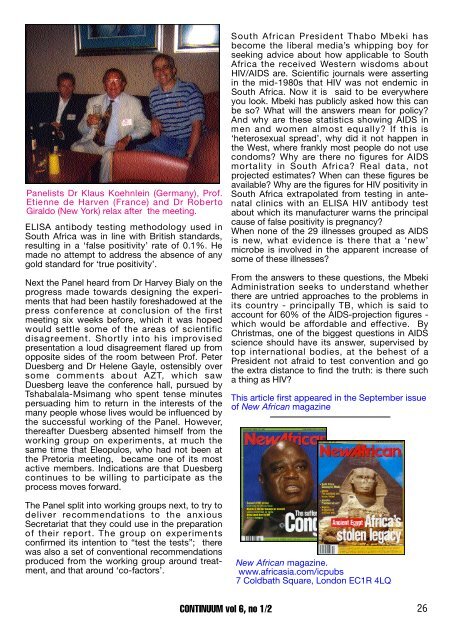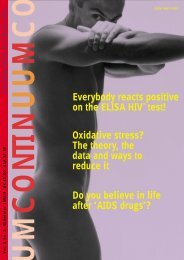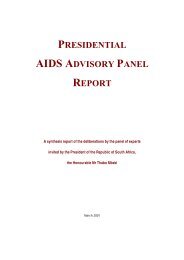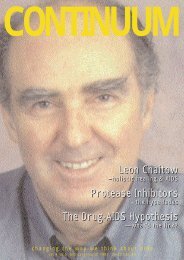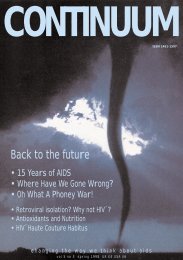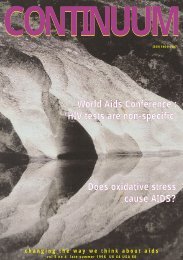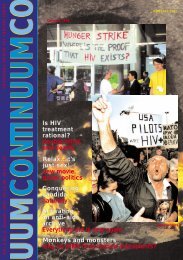AIDS post-HIV : beat of a different drummer - AltHeal
AIDS post-HIV : beat of a different drummer - AltHeal
AIDS post-HIV : beat of a different drummer - AltHeal
Create successful ePaper yourself
Turn your PDF publications into a flip-book with our unique Google optimized e-Paper software.
Panelists Dr Klaus Koehnlein (Germany), Pro f .<br />
Etienne de Harven (France) and Dr Roberto<br />
Giraldo (New York) relax after the meeting.<br />
ELISA antibody testing methodology used in<br />
South Africa was in line with British standard s ,<br />
resulting in a ‘false positivity’ rate <strong>of</strong> 0.1%. He<br />
made no attempt to address the absence <strong>of</strong> any<br />
gold standard for ‘true positivity’.<br />
Next the Panel heard from Dr Harvey Bialy on the<br />
p ro g ress made towards designing the experiments<br />
that had been hastily foreshadowed at the<br />
p ress conference at conclusion <strong>of</strong> the first<br />
meeting six weeks before, which it was hoped<br />
would settle some <strong>of</strong> the areas <strong>of</strong> scientific<br />
d i s a g reement. Shortly into his impro v i s e d<br />
presentation a loud disagreement flared up from<br />
opposite sides <strong>of</strong> the room between Pr<strong>of</strong>. Peter<br />
D u e s b e rg and Dr Helene Gayle, ostensibly over<br />
some comments about AZT, which saw<br />
Duesberg leave the conference hall, pursued by<br />
Tshabalala-Msimang who spent tense minutes<br />
persuading him to re t u rn in the interests <strong>of</strong> the<br />
many people whose lives would be influenced by<br />
the successful working <strong>of</strong> the Panel. However,<br />
t h e reafter Duesberg absented himself from the<br />
working group on experiments, at much the<br />
same time that Eleopulos, who had not been at<br />
the Pretoria meeting, became one <strong>of</strong> its most<br />
active members. Indications are that Duesberg<br />
continues to be willing to participate as the<br />
process moves forward.<br />
The Panel split into working groups next, to try to<br />
deliver recommendations to the anxious<br />
Secretariat that they could use in the preparation<br />
<strong>of</strong> their report. The group on experiments<br />
confirmed its intention to “test the tests”; there<br />
was also a set <strong>of</strong> conventional recommendations<br />
p roduced from the working group around tre a t-<br />
ment, and that around ‘co-factors’.<br />
South African President Thabo Mbeki has<br />
become the liberal media’s whipping boy for<br />
seeking advice about how applicable to South<br />
Africa the received We s t e rn wisdoms about<br />
<strong>HIV</strong>/<strong>AIDS</strong> are. Scientific journals were asserting<br />
in the mid-1980s that <strong>HIV</strong> was not endemic in<br />
South Africa. Now it is said to be everywhere<br />
you look. Mbeki has publicly asked how this can<br />
be so What will the answers mean for policy<br />
And why are these statistics showing <strong>AIDS</strong> in<br />
men and women almost equally If this is<br />
‘ h e t e rosexual spread’, why did it not happen in<br />
the West, where frankly most people do not use<br />
condoms Why are there no figures for <strong>AIDS</strong><br />
mortality in South Africa Real data, not<br />
projected estimates When can these figures be<br />
available Why are the figures for <strong>HIV</strong> positivity in<br />
South Africa extrapolated from testing in antenatal<br />
clinics with an ELISA <strong>HIV</strong> antibody test<br />
about which its manufacturer warns the principal<br />
cause <strong>of</strong> false positivity is pregnancy<br />
When none <strong>of</strong> the 29 illnesses grouped as <strong>AIDS</strong><br />
is new, what evidence is there that a ‘new’<br />
m i c robe is involved in the apparent increase <strong>of</strong><br />
some <strong>of</strong> these illnesses<br />
From the answers to these questions, the Mbeki<br />
Administration seeks to understand whether<br />
there are untried approaches to the problems in<br />
its country - principally TB, which is said to<br />
account for 60% <strong>of</strong> the <strong>AIDS</strong>-projection figures -<br />
which would be aff o rdable and effective. By<br />
Christmas, one <strong>of</strong> the biggest questions in <strong>AIDS</strong><br />
science should have its answer, supervised by<br />
top international bodies, at the behest <strong>of</strong> a<br />
P resident not afraid to test convention and go<br />
the extra distance to find the truth: is there such<br />
a thing as <strong>HIV</strong><br />
This article first appeared in the September issue<br />
<strong>of</strong> New African magazine<br />
New African magazine.<br />
www.africasia.com/icpubs<br />
7 Coldbath Square, London EC1R 4LQ<br />
CONTINUUM vol 6, no 1/2 26


